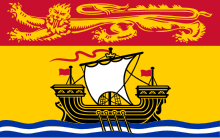Executive Council of New Brunswick
 | |
 | |
| Agency overview | |
|---|---|
| Jurisdiction | New Brunswick |
| Agency executives |
|
| Parent department | Government of New Brunswick |
The Executive Council of New Brunswick (French: Conseil exécutif du Nouveau-Brunswick), informally and more commonly, the Cabinet of New Brunswick (French: Cabinet du Nouveau-Brunswick), is the Cabinet of the Canadian province of New Brunswick.
Almost always made up of members of the Legislative Assembly of New Brunswick, though not necessarily so, New Brunswick's Cabinet is similar in structure and role to the federal Cabinet of Canada, while being smaller in size. As federal and provincial responsibilities and areas of jurisdiction differ, there are a number of different portfolios between the federal and provincial governments. For example, education being a provincial domain, New Brunswick has a Minister of Education, while the federal Cabinet would not.
The Lieutenant-Governor of New Brunswick, as representative of the King in Right of New Brunswick, appoints the Premier and the Executive Council of whichever party forms government in a given legislature, which exists to advise him or her on the governance of the Province.[1] The term "Lieutenant-Governor in Council" refers to the Lieutenant-Governor acting on the recommendations of Cabinet, though he or she has no real decision-making authority. Members of the Executive Council, called Cabinet Ministers, are appointed on the recommendation of the Premier, at whose pleasure they serve, and each oversees a certain area of the provincial government, called a "portfolio". Some Ministers head entire government departments ("Minister of ..."), while others are responsible for parts of departments or cross-government initiatives ("Minister responsible for ...").
The Cabinet meets on a weekly basis during the fall, winter and spring, and a monthly basis during the summer, at which Ministers and the Premier discuss policy matters and the governance of the Province. Such meetings are confidential, under the principle of "Cabinet confidentiality", and Ministers must agree to present a united front based on whichever decision is taken. Government departments will often bring proposals to Cabinet for direction or approval (for example, to draft a Bill or enter into an agreement), on which Cabinet will issue a decision and, where applicable, provide a recommendation to the Lieutenant-Governor for issuing an Order-in-Council.
There are currently two committees within the Cabinet: Policy and Priorities Board, which studies strategic and policy matters and is chaired by the Premier, and Treasury Board, which studies financial and administrative matters and is chaired by the Minister of Finance. The two committees may also hold a joint meeting. There was previously a COVID-19 Cabinet Committee, which, uniquely, included members from all parties in the New Brunswick Legislative Assembly.[2] However, in late 2021, committee members from the Green and Liberal parties quit the committee over a controversy in which the provincial government had issued an emergency order forcing striking healthcare workers back to work.[3]
Current Cabinet
[edit]The current Cabinet is led by Premier Blaine Higgs. The governing party is the Progressive Conservatives.
| Lieutenant governor | Since | |
|---|---|---|
| Brenda Murphy | September 8, 2019 | |
| Minister | Portfolio | Since |
| Blaine Higgs | Premier of New Brunswick | November 9, 2018 |
| President of the Executive Council | ||
| Minister responsible for Intergovernmental Affairs | September 12, 2019[4] | |
| Hugh John (Ted) Flemming | Minister of Justice | September 29, 2020 |
| Attorney General | ||
| Minister of Natural Resources and Energy Development | June 6, 2024 | |
| Kris Austin | Minister of Public Safety | October 13, 2022 |
| Richard Ames | Minister of Transportation and Infrastructure | June 27, 2023 |
| Margaret Johnson | Minister of Agriculture, Aquaculture and Fisheries | September 29, 2020 |
| Jill Green | Minister of Social Development | June 27, 2023 |
| Minister responsible for New Brunswick Housing Corporation | ||
| Bill Hogan | Minister of Education and Early Childhood Development | October 13, 2022 |
| Ernie Steeves | Minister of Finance and Treasury Board | November 9, 2018 |
| Greg Turner | Minister of Post-secondary Education, Training and Labour | February 2, 2024 |
| Minister responsible for Immigration | ||
| Minister responsible for Economic Development and Small Business | June 27, 2023 | |
| Minister responsible for Opportunities NB | ||
| Réjean Savoie | Minister responsible for the Regional Development Corporation | October 13, 2022 |
| Minister of Indigenous Affairs | June 6, 2024 | |
| Glen Savoie | Minister of Local Government | June 27, 2023 |
| Minister of Environment and Climate Change | May 8, 2024 | |
| Minister responsible for la Francophonie | February 21, 2020 | |
| Bruce Fitch | Minister of Health | July 15, 2022 |
| Mary Wilson | Minister of Service New Brunswick | September 29, 2020 |
| Minister responsible for Military Affairs | ||
| Tammy Scott-Wallace | Minister of Tourism, Heritage and Culture | September 29, 2020 |
| Sherry Wilson | Minister responsible for Women's Equality | June 27, 2023 |
| Minister responsible for Addictions and Mental Health Services | ||
| Kathy Bockus | Minister responsible for Seniors | June 27, 2023 |
References
[edit]- ^ "Executive Council Act". laws.gnb.ca. Retrieved 2024-07-14.
- ^ "New cabinet committee on novel coronavirus appointed". www2.gnb.ca. March 12, 2020. Retrieved 2024-07-14.
- ^ "Liberal, Green leaders withdraw from COVID commitee as striking health-care workers forced back - New Brunswick". Global News. Retrieved 2024-07-14.
- ^ Government of New Brunswick, Executive Council Office. Order-in-Council 2019-173. "Under section 2 of the Executive Council Act, the Lieutenant- Governor in Council appoints under the Great Seal of the Province, the Honourable Blaine Higgs, Minister of Intergovernmental Affairs, effective September 12, 2019."
External links
[edit]- Cabinet as of June 27, 2023
- Cabinet as of September 29, 2020
- Cabinet as of February 21, 2020
- Cabinet as of November 9, 2018
- Cabinet as of October 5, 2018
- Cabinet as of May 11, 2018
- Cabinet as of September 5, 2017
- Cabinet as of June 6, 2016
- Cabinet as of October 7, 2014
- Cabinet as of September 23, 2013
- Cabinet as of October 9, 2012
- Cabinet as of March 15, 2012
- Cabinet as of October 12, 2010
- Cabinet as of May 10, 2010
- Cabinet as of January 4, 2010
- Cabinet as of June 22, 2009
- Cabinet as of November 12, 2008 Archived June 25, 2018, at the Wayback Machine
- Cabinet as of October 31, 2007
- Cabinet as of October 3, 2006 Archived February 20, 2012, at the Wayback Machine
- Cabinet as of February 14, 2006 Archived October 15, 2006, at the Wayback Machine
- Cabinet as of June 27, 2003
- Cabinet as of October 9, 2001
- Cabinet as of March 23, 2000
- Cabinet as of June 21, 1999

